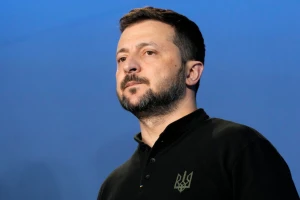
Russia attacks Ukrainian-Romanian border checkpoint when bus with children was there
Due to Russian strikes on the Izmail district of Odesa region, which borders Romania, the Orlivka checkpoint stopped working. At the time of the attack, there was a bus with children there
Yuriy Dimchoglo, founder of the Orlivka ferry complex, told Radio Liberty.
According to him, at the time of the air attack, a bus with children was waiting to leave the checkpoint, but it was quickly removed.
"There were two buses, one to enter Ukraine and one to leave. The one leaving was with children. He was quickly registered, put on a Romanian ferry, which was almost leaving the shore, at the beginning of the strikes. Thank God that there was no bus with children at the checkpoint. Because I don't know what would have happened," Dimchoglo said.
The second bus was cleared in 10 minutes. When it was leaving, there were strikes, and the glass in the bus cracked. Only the drivers were injured.
As for the damage to the infrastructure of the checkpoint, the warehouses were damaged.
"The civilian infrastructure of the checkpoint was damaged, a lot of civilian, international trucks, about 30 trucks. Six of them burned down completely. The warehouses were slightly damaged, but there were no direct hits. The main hits were in the customs areas and accumulation zones of international transport for customs control, especially at the entrance to Ukraine," said Dimchoglo.
He noted that the administrative building of the checkpoint survived, but the shock wave smashed the windows.
Dimchoglo also emphasized that the crossing point is a completely civilian facility, with no military personnel present, except for border guards. At the same time, it is also the only border crossing point with an EU country in southern Ukraine.
Earlier, Natalia Humeniuk, the head of the joint coordination press center of the Southern Defense Forces, refuted claims circulating in Telegram channels that Russian drones had crossed into Romania during the nighttime attack on the Izmail district.
"We have not received any confirmation from our neighboring state regarding such incidents, nor have we observed any such activity," emphasized Humeniuk.
Simultaneously, Ukraine's State Border Service reported the temporary suspension of the "Orlivka - Isakcha" ferry crossing point's operations between Ukraine and Romania in the Odesa region. Efforts are underway to restore normal operations following the enemy's nighttime assault.
"We will provide updates on the resumption of transit operations, but for now, we kindly ask travelers to consider alternative routes to Romania," they added.
Regarding incidents involving the falling fragments of Russian drones in Romania
During the night of September 3-4, Russia conducted a significant attack in southern Ukraine using Iranian kamikaze drones. According to border guards, some of these drones crashed and exploded on Romanian territory, which is a member of NATO. Ukraine's Minister of Foreign Affairs, Dmytro Kuleba, presented photographic evidence of these drone incidents.
However, the Ministry of Foreign Affairs of Romania stated that the drone attacks by the Russian Federation did not pose a direct military threat to their national territory or territorial waters. Additionally, on September 5, Romania's President, Klaus Iohannis, stated that neither Russian drones nor any related debris fell on Romanian soil.
Nevertheless, OSINT (Open-Source Intelligence) analysts confirmed that a Russian drone had indeed fallen in the vicinity of a Romanian border village.
By September 6, Romania's Minister of Defense, Angel Tîlvăr, acknowledged that his ministry's team had discovered probable fragments of a Russian drone within the country's borders. Romania promptly informed NATO about these findings, which resembled Russian military drones. NATO expressed its support and stated it was monitoring the situation.
On September 12, it was reported that Romania's Ministry of Defense began constructing shelters for the population in the village of Plauru, near Izmail, Ukraine. Nonetheless, the country's Prime Minister, Marcel Ciolacu, assured the public that there was no cause for alarm and urged calm among the population.
Subsequently, Romania's Ministry of Foreign Affairs issued a "strong protest" to Russia concerning the drone debris falling on Romanian territory. They also summoned the Russian ambassador and held consultations with NATO.
Deputy Chief of Defense Staff of Romania affirmed the readiness of Romania's armed forces to intercept Russian drones if necessary.
- News














































